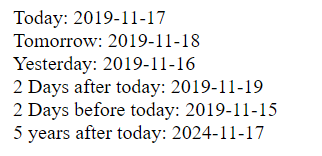
Introduction to Date Function in PHP
There are various in-built functions in PHP. PHP date function makes processing easy with the date and its related operations. This date() function can be used to get and set the date and the time as per our business requirements. PHP time() function gives timestamp as an output. The function date() can be used to get the date into the human-readable format by using the timestamp. We can use the PHP date() function in various ways. Almost every programming language has an in-build date function to deal with the date and the time. In the coming section, we will see various types of use of this PHP date() function with example.
The Use of the Date Function
The moment we come to any system (online application), date plays a great role. For any business operations and the processes, we need to keep track of the date and time. For example – if we are adding an inventory item to the system, we need to capture the date, so that we can get when an inventory item has been added. The date() can be used to keep the date and the time in the database (a record) for business-related processes. A date can be format in various ways, for this we can pass the defined parameter to get the desired date format output. We can use the date() function and various other related functions in our PHP application or the program.
Date Functions and Examples
The date() function always takes a parameter.
Syntax:
date(Param1, Param2);Where Param1 is the required parameter that denoted the format of the date and Param2 is the timestamp that is the optional one. Param1 is the sting where Param2 in the long integer.
1. Get the current date
Code:
<?php
echo "Date: " . date("Y/m/d"); // 2019/11/17
echo "<br>";
echo "Date: " . date("d-M-Y"); // 17-Nov-2019
?>Output:

Please note that we are getting 17 Nov 2019 just because this has been run on the 17th Nov 2019.
We can see the above program, date(“Y/m/d”) will give us 2019 in place of Y (capital letter Y), 11 in place of m (small m), 17 in place of d (small d). If we run the same PHP program on the 20th of Jan 2020, we will get the output accordingly, which means it will give the current date.
2. Get the current timestamp
We have the time() function in the PHP to get the timestamp. The timestamp is nothing but it’s a numeric value between the time start to the current time. The timestamp date is fixed that is 1970-01-01 00:00:00 (1970-01-01 at 0 hours, 0 minutes and 0 seconds) in GMT.
Code:
<?php
echo "Current Timestamp: ".time();
?>Output:
![]()
At any point in time, we can get the timestamp to date and the date to timestamp using in PHP.
3. Get the date from a timestamp:
In this, we will be using both the parameter of the date function. The first parameter will be the date format we want as an output and the second one is the timestamp itself. Let’s see the same with a quick example.
Code:
<?php
$timeStamp = 1574012580;
echo "Timestamp $timeStamp to Date is " . date("d/M/Y",$timeStamp);
?>Output:
![]()
4. Print the year and the month in separate of a given timestamp
Code:
<?php
$timeStamp = 1574012580;
echo "Year: " . date("Y",$timeStamp); // year
echo "<br>";
echo "Month: " . date("M",$timeStamp); // month in 3 character format
?>Output:

5. Get the date from the mktime() function
Yes, we have another function in PHP that ins mktime() to deal with the date-related kinds of stuff. We can use the various numeric parameter with the mktime(). This mktime() again gives the output as a timestamp. We can get the date using mktime() function output as a 2nd parameter of the date() function, let’s see the same with an example.
Code:
<?php
$mktime = mktime(01, 01, 59, 11, 17, 2019); // 01 = hour, 01 = minute, 59 = second, 11= month, 17 = day, 2019 = year
echo "Year: " . date("Y-M-d, h: i: sa ", $mktime); // year-month-date
?>A sequence of the mktime parameter values = hours, minutes, seconds, months, days and years. This sequence is fixed and predefined, if we will make any mistake in passing the parameter then we will have to wring date as an output, so we need to be careful while dealing with this function.
Output:
![]()
6. Strtotime() function in PHP
We have another function strtotime(). This is a function; we can pass a string to get the date as per requirements. For example, we can pass today, tomorrow, yesterday, +2 days, -2 days, +5 years like that. Then we can use the output of this function to get the date and the time using the date() function. Let’s see the same with a quick example.
Code:
<?php
echo "Today: ". date("Y-m-d", strtotime("today")) . "<br>";
echo "Tomorrow: ". date("Y-m-d", strtotime("tomorrow")) . "<br>";
echo "Yesterday: ". date("Y-m-d", strtotime("Yesterday")) . "<br>";
echo "2 Days after today: ". date("Y-m-d", strtotime("+2 days")) . "<br>";
echo "2 Days before today: ". date("Y-m-d", strtotime("-2 days")) . "<br>";
echo "5 years after today: ". date("Y-m-d", strtotime("+5 years")) . "<br>";
?>Output:

Apart from the above mentioned we have other various function
- date_default_timezone_set(): This function can be used to set the time zone. Like we use Asia/Kolkata time zone in PHP for India.
- date_default_timezone_get(): This function can be used to get the current time zone that is set in the php. We can change the time zone using the date_default_timezone_set(“time-zone”); function. We can directly pass the time zone name to set the specified time zone.
Code:
<?php
echo date_default_timezone_get(); //to get the timezone
echo "<br>";
date_default_timezone_set('Asia/Kolkata');
echo date_default_timezone_get(); //to get the timezone
?>Output:

Conclusion
We can simply say, this PHP date() function really plays a vital role in any online application. It is always advisable to keep the timestamp into the database table so that we will have the flexibility that we can get the date and time from that as per our needs.
Recommended Articles
This is a guide to Date Function in PHP. Here we discuss the introduction, Use of the Date Function, and Examples along with codes and output. You may also look at the following articles to learn more-


